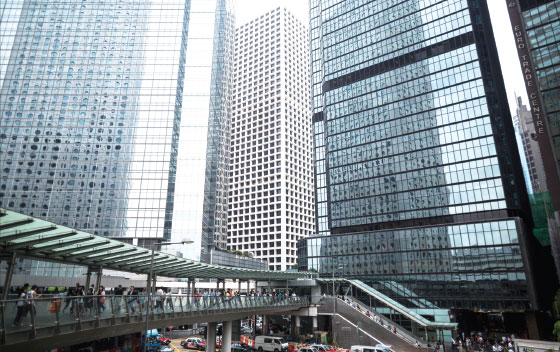Credit squeeze deals blow to SMEs
|
Hong Kong's Central financial district - the seat of many of the city's most prominent businesses. Small and medium-sized enterprises in Hong Kong have hit the bottleneck in raising funds from the capital market amid the global economic slowdown. Jerome Favre / Bloomberg |
Small businesses in dire straits as competition heats up, rents go through roof
Small and medium-sized enterprises (SMEs) in Hong Kong have difficulty raising funds for business development as persistently fragile global macroeconomic conditions cloud prospects.
More than 70 percent of SMEs in the SAR had sought external financing last year but less than 20 percent had experienced easy or very easy access to credit, a CPA Australia survey shows.
CPA Australia interviewed 2,971 Asian SMEs, defined as businesses with less than 20 employees, in October last year and gauged their business confidence for this year. The survey included 311 Hong Kong SMEs and also covered Australia, the Chinese mainland, Indonesia, Malaysia, New Zealand, Singapore and Vietnam.
For Hong Kong SMEs, 72.7 percent of the respondents said they required funds from an external source but just 19.9 percent of them found this easy or very easy.
The survey also showed more than 30 percent of Hong Kong SMEs' financing was from bank loans, followed by private investors (over 20 percent) and venture capital (below 10 percent).
"While SME demand for funds remains, banks in Hong Kong are generally conservative in granting loans to SMEs because they need to satisfy stringent requirements of legal compliances," said Peter Lee Man-kit, CPA Australia's former Greater China divisional president. Unlike Australia, Hong Kong did not have small, local banks which could support SMEs.
"Hong Kong also does not have a vibrant private equity/venture capital ecosystem that can provide long-term stable capital funding sources to local SMEs other than bank loans," he said.
In addition to difficulty in obtaining capital, Hong Kong small businesses also grappled with other major hurdles in their operations.
"Mounting costs, growing competition and soaring rents are the main issues Hong Kong businesses are most likely to believe that are barriers to their growth," CPA Australia, an accounting industry body representing more than 160,000 members, highlighted in its report summary.
Hong Kong SMEs' operations are clouded by a persistently anemic external economic environment despite the export sector having apparently rebounded.
The Hong Kong Trade Development Council (HKTDC) export index for the first quarter of this year rose to 47.1 from 33.7 in the previous quarter - the biggest jump in the past three years, but still below the threshold level of 50 points.
"The data showed that global economic headwinds facing Hong Kong's exports have eased," said HKTDC Research Director Nicholas Kwan Ka-ming.
"We expect Hong Kong's export volume to rise 0.5 percent and export value to remain flat this year," he added.
The Standard Chartered Hong Kong SME Leading Business Index, which interviewed 821 local small business firms in December last year, had edged down to 41.9 for the first quarter this year, remaining below the threshold of 50 points for two years.
Kelvin Lau Kin-hang, senior economist at Standard Chartered Hong Kong, cautioned: "The result suggests low expectation among our SME respondents in seeing a quick turnaround in external and domestic demand. This echoes our view that 2017 is likely to be a full year of global geopolitical uncertainties."
"SMEs are cautious about the economic outlook of Hong Kong and their business performance in 2017."
The Nikkei Hong Kong Purchasing Managers Index, compiled by IHS Markit, registered 49.6 in February from 49.9 in January. This suggested the health of Hong Kong's private sector stayed fragile and business sentiment remained downbeat.
IHS Markit Economist Bernard Aw warned: "Weak economic conditions and a strong exchange rate had dampened client demand. Unsurprisingly, business sentiments about future output remained downbeat."
Global trade credit insurer Euler Hermes, a subsidiary of German fund manager Allianz, anticipated corporate insolvencies would rise 5 percent in Hong Kong this year, against last year's projected zero percent. The insurer said a decrease in private demand from the Chinese mainland and the possibility of tighter monetary conditions in the United States in the months to come had dented the business outlook for Hong Kong SMEs.
Faced with market competition and surging rent and staff costs, Hong Kong SMEs are banking on innovation to support long-term growth and competitiveness.
The CPA Australia survey revealed that 39.2 percent of the Hong Kong SMEs expected to substantially grow their e-commerce presence; 76.8 percent earned revenue from online sales and a further 83.9 percent used social media for business purposes.
"The level at which small businesses in Hong Kong are embracing e-commerce could, in part, be an attempt to reduce the required real-estate footprint and help ease some of the rental cost burden," CPA Australia Chief Executive Alex Malley reckoned.
oswald@chinadailyhk.com

















